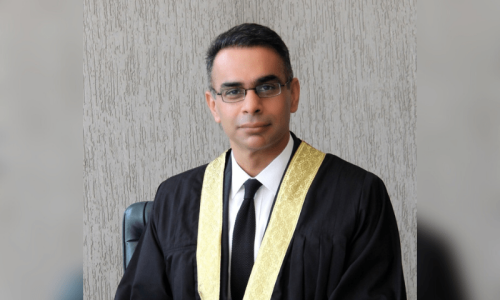THE Islamabad High Court (IHC) order in the audio leaks case has been challenged by the government in the Supreme Court and an SRO authorising the Inter-Services Intelligence Agency (ISI) to surveil citizens on the vague pretext of national security has been issued by the government. This SRO has already been challenged before the Lahore and Islamabad high courts.
Seemingly, the SRO is a reaction to the IHC’s inquiry into the lawfulness of surveillance and whether any entity was authorised by law to intercept communication. The answer was a resounding no, so the government thought the fix to this would be to ‘legalise’ what was already being done in practice, post facto.
The SRO states: “The federal government in the interest of national security and in the apprehension of any offence, is pleased to authorise the officers not below the rank of grade 18 to be nominated from time to time by the Inter-Services Intelligence to intercept calls and messages or to trace calls through any telecommunications system as envisaged under Section 54 of the Act.”
The Act referred to here is the Pakistan Telecommunication (Reorganisation) Act, 1996. The authorisation, given under Section 54(1) reads as follows: “54. National Security — (1) Notwithstanding anything contained in any law for the time being in force, in the interest of national security or in the apprehension of any offence, the Federal Government may authorise any person or persons to intercept calls and messages or to trace calls through any telecommunication system.”
National security cannot be an umbrella phrase simply thrown around, unqualified or accepted at face value.
This make-it-up-on-the-go modus operandi is a consistent feature. If the legality of a prevailing practice is called into question, issue an SRO, pass a law. Make it ‘legal’ if it isn’t. But does it make it legal?
The Investigation for Fair Trial Act 2013 (IFTA’13) subjects all surveillance to warrants. The application for a warrant has to be filed by an applicant who is defined under IFTA’13 as the directorate general of the ISI. The authorised officer is defined as an officer, “not below the rank of BPS-20” whereas the SRO authorises an 18-grade officer to be nominated by the agency.
Now the IHC order establishes that no warrant for surveillance has been sought in 11 years of the law’s existence. Issuing an SRO does not explain or account for a violation of existing law for over a decade while the practice of surveilling citizens has persisted in violation of it. But what of the practice that has persisted all these years, absent this authorisation? And can such an SRO supersede IFTA’13?
Legal questions aside, which will now be settled in court, there have been varying reactions to the SRO. One view holds it to be blatantly unconstitutional, unlawful, overbroad, discretionary giving unbridled powers, whereas the other sees the SRO as a step towards transparency and accountability, that the government has been forced to put something on record, and now it will be known who is doing it, pinning responsibility paving the way for accountability. But how? How do you hold an intelligence agency that operates under the executive on paper but figures over and above it in reality, accountable through an SRO? Over the years, there have been attempts to bring it into the accountability framework under the civilian ambit, but these have not seen the light of day.
To the extent of having something on paper and invoking its existence is one thing. But what meaning do legal structures have absent a rule-of-law regime, in which executive overreach and lack of accountability is the norm? Today’s Pakistan is akin to a Kafka-esque reality where supposedly a Constitution exists and there are laws and courts; but despite it all, people disappear and are jailed on whims; the process is punishment, and there are no guarantees vis-à-vis life, liberty or dignity. Abuse of power and political victimisation are widespread. The law and Constitution serve no protection before or after an incident in a meaningful manner affecting the day-to-day lives of citizens. The SRO then is an announcement by the executive that rather than scaling back its excesses, they will only be codified further into the letter of executive notifications and laws.
National security cannot be an umbrella phrase simply thrown around, unqualified or accepted at face value. Who are the four million being surveilled under Lawful Interception Management System? Based on what criteria? When it comes to surveillance and methods of interception, the invasiveness of the tech tools matters.
Surveillance today is far more intrusive. Monitoring of voice conversations between two people earlier through a landline or now on the open line is very different today in the age of the internet and smartphones. How is a WhatsApp call being intercepted? If not through the telecommunications network since it is end-to-end encrypted, is it by infecting the device? Through what methods? Where is the sanction for it? Once there is intrusion into a device, everyone communicating with the person becomes a subject of surveillance. What of journalists and their sources? Lawyers and their engagement with clients — particularly those trying to escape unlawful abductions and arrests? Smartphones contain an individual’s entire digital footprint. They are a repository of someone’s whole life — personal and professional.
Article 14 is an inviolable right. An intrusion into someone’s device is an intrusion into their home and a violation of their dignity. Can such broad-based intrusion be considered legitimate or lawful by any measure? In an environment where information is extracted for the purpose of blackmailing, there needs to be scrutiny first of the excesses of the executive rather than justifications that someone must do it or that it must be done.
The writer is a co-founder of Bolo Bhi, an advocacy forum for digital rights.
Published in Dawn, July 15th, 2024

















































